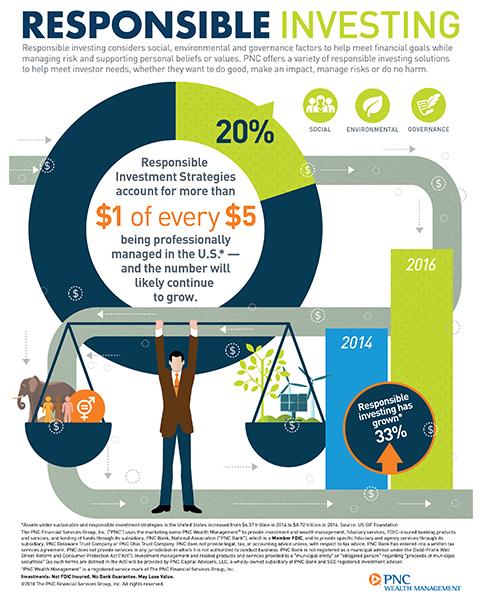PNC: Responsible Investing Grows More Popular with Investors
Responsible investing allows you to invest in ways that align with your values without sacrificing financial performance.

The expression “put your money where your mouth is” may be more possible than you realize. Responsible investing options allow you to invest your money in a way that aligns with your values while potentially minimizing risk.
“More and more people want to invest in companies that match their values – or they want to avoid investing in companies that don’t match their values,” says David Alt, PNC Asset Management Group’s head of Responsible Investing. At PNC, responsible investing includes methods of investing in which you can choose how to invest your money based on environmental, social or governance issues, as well as financial performance.
Although responsible investing has been around for decades, it’s gaining popularity now that there are mainstream options for people at all different income levels and for those passionate about different causes and issues. Companies also are growing more conscious about making socially responsible decisions, providing more options for responsible investors. Some groups, such as Millennials, Generation X and non-profit organizations are particularly interested in responsible investing right now, but they’re not the only ones taking advantage of it. In 2016, responsible investment strategies accounted for $1 of every $5 being professionally managed in the United States – and the number will likely continue to grow.[1]
“Identity is important for both people and organizations. For example, a non-profit organization that supports cancer patients may want to invest in a way that will help advance their mission. Investing in tobacco stocks would obviously be contrary to their mission. We can help them avoid those kinds of contradictions and align with their values while planning their investment portfolio. The same is true for individuals,” Alt says.
Getting Started with Responsible Investing
Alt says that if you want to start using responsible investing strategies, you should find a trusted advisor. “There is a lot of confusion surrounding responsible investing. In the past, there was a stigma about underperformance, but now there are ways to screen things out and reinvest funds to better match the benchmark returns you’re seeking. This allows you to get the same relative performance without sacrificing your values,” he says.
Most responsible investing options come down to your position on four intentions:
- Making an Impact: targeting specific outcomes, typically in private markets
- Doing No Harm: aligning your values and portfolio on an exclusionary basis (screening out and avoiding certain causes)
- Managing Risk: using strategies focused on environmental, social or governance standards and risks
- Doing Good: aligning values and portfolio in an inclusionary manner (by supporting certain causes)
Some popular “do good” factors include alternative energy, green building and sustainable water. Popular “do no harm” factors for investors are board composition, climate change, labor standards and human rights.
“The key point is that responsible investing is a journey, not a destination, and we believe the proper guidance of a trusted advisor could help to pave the way for investors,” Alt says.
Learn more about responsible investing »
